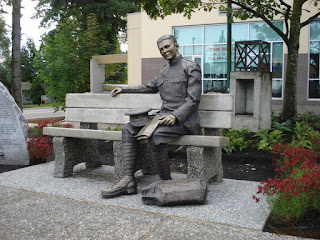"Canucks in Khaki" a most timely read as Vimy's 100th marked
The First World War took place 100 years ago. Firsthand remembrances of it have faded. Most people today view it as a complete and utter waste of lives and resources – which is true enough, considering that the final outcomes included the fall of numerous European monarchies, the rise of the Soviet Union and, most ominously, the setting of the stage for the Second World War, which began just 20 years after the first war ended. Yet, as is the case with all major historical events, we ignore or forget them at our peril. The First World War shaped Canada, and shaped its people and communities. It continues to shape us today, in very subtle ways. “Many Canadians view the First World War as ancient history. Its relevance to the present is little understood. Yet, other than Confederation itself, the Great War of 1914-1918 was arguably the most important event in Canadian history. Without it, Canada and indeed the rest of the world have been far different places.” That’s the view o...

